5 document fraud detectors every bank, lender, and fintech needs
Table of Contents
[ show ]- Loading table of contents...
Stephanie Spangler
In a recent Inscribe survey, our customers told us they have become much more diligent in underwriting loans and approving customers due to an increase in fraud attempts and defaults this year.
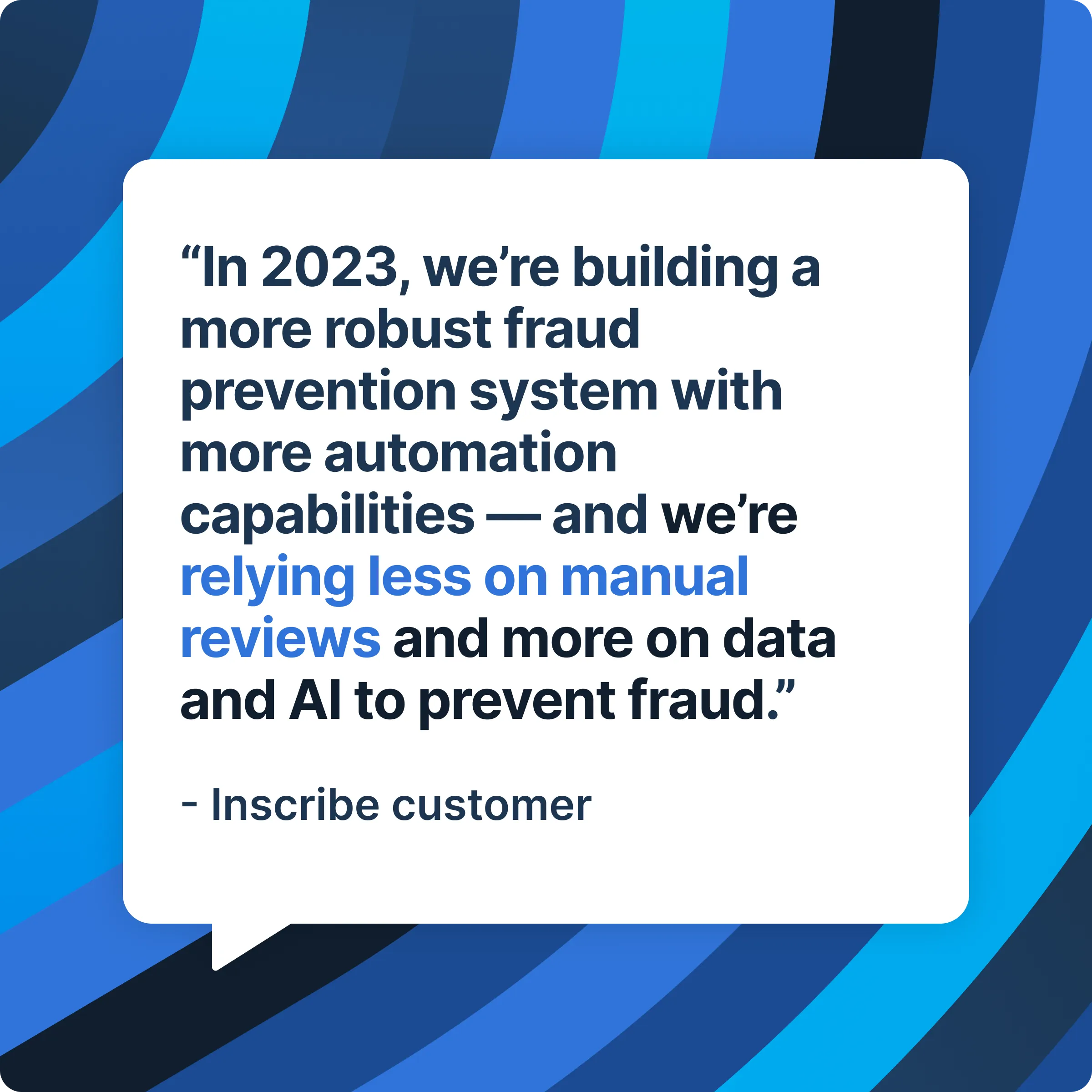
Why? They know that during tough economic times, fraud attempts increase due to financial hardship. The Association of Certified Fraud Examiners released a study on the impact of the economic recession from 2008 – 2009. They concluded that the economic crisis led to financial pressure which caused an increase in fraud. The same thing happened during COVID, and we’re here again today.
Fraudsters have an unfair advantage
Fraudsters know that companies are cutting costs. Often they’re reducing their investment in the people and tools needed to keep fraudsters out. Some fintechs and financial institutions may even rely solely on small manual review teams to catch fraud. But manual reviews make popular tactics like document fraud easy to accomplish and difficult to catch.
Less than 10% of document fraud is visible to the human eye. Many of the adjustments to names, account numbers, balances, and transactions simply can’t be seen. And, as a result, countless cases of fraud and credit abuse go undetected.
That’s where Inscribe comes in. We care deeply about the problem of document fraud and are dedicated to helping companies outsmart fraudsters with AI. We have an experienced team of data scientists and engineers who operate like investigators to build models that unlock invisible document fraud signals using the latest advancements in AI technology.
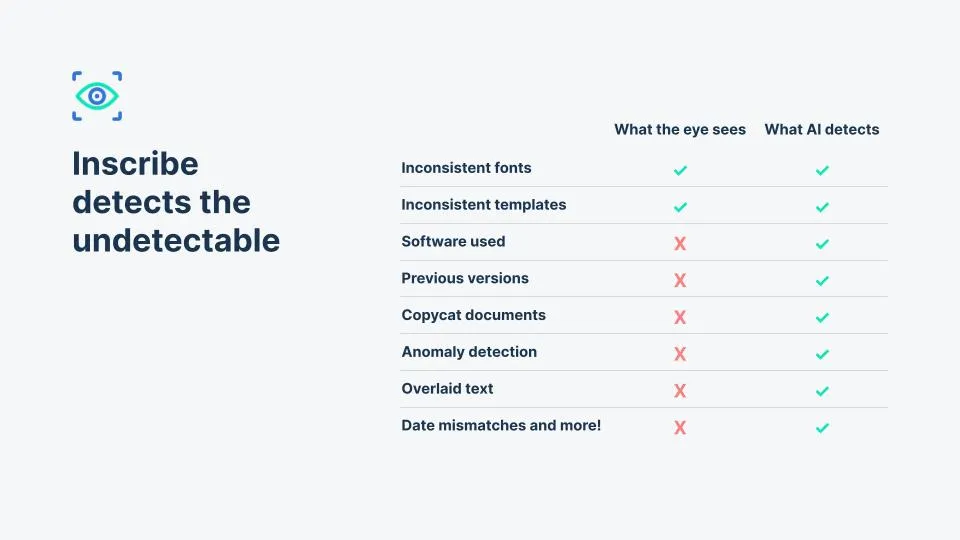
We have many fraud detectors in place, and they can be thought of in two categories:
- Document forensics: Looks for things like previous document versions, software used on the document, and font inconsistencies.
- Network-based detectors: Relies on a large network of historical documents to be effective and includes detectors like Fingerprint, which checks to see if a document conforms to the expected characteristics of a Bank of America statement for example.
Because we have such a diverse network of documents coming into our platform every day, and because we don’t rely on humans in the loop, we’re able to provide the most reliable and cost-effective solution in the market today. When new fraud tactics emerge, Inscribe knows about them first. And these innovations have enabled our customers to transform their operations.
Document fraud detectors you need as part of a modern risk ecosystem
While Inscribe provides a wide range of fraud detectors, here are a few that will help you identify legitimate versus fraudulent applicants with confidence.
1. X-ray
Shows the uploaded and recovered versions of a document so you can see exactly what’s been changed. This is a strong signal of fraud if key details, like names or balances, have been changed. This feature is an Inscribe customer favorite!

2. Inconsistent fonts
Indicates if more than one font was used in a given word. This is a strong signal of fraud if a font discrepancy appears on a key detail, like an account number.
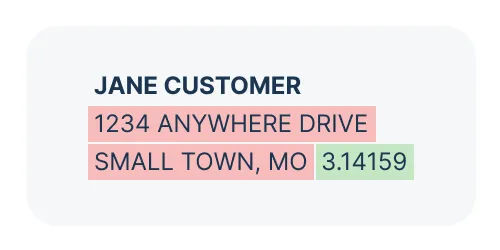
3. Software used
Determines if software was used to alter the document. If software like Adobe Photoshop appears, this is a strong signal of fraud.

4. Fingerprint
Indicates if a document deviates from that of a typical bank statement, like a Bank of America statement for example. This may be a strong enough signal to reflect a document if other fraud signals are present.
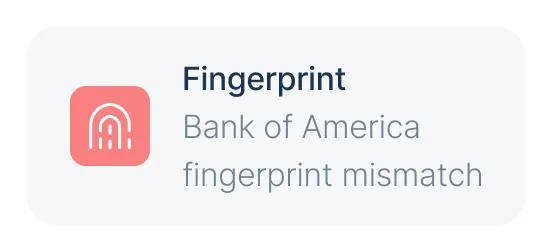
5. PDF alignment
Indicates if a name or address is misaligned by examining where the first character starts. This is a strong signal of fraud.
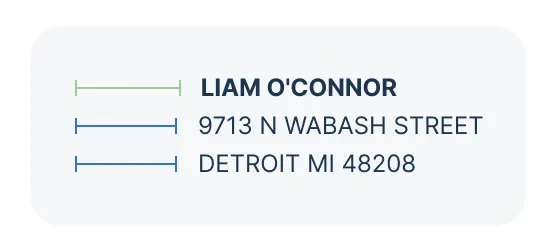
While manual review teams may be able to spot obvious template and font deviations, there are too many things they simply can’t see. And a manual reviewer simply can’t match the speed of AI, which only takes seconds to conduct an in-depth review. By automating tedious manual document reviews, you can reduce fraud and credit losses while increasing customer win rates and employee efficiency — all while protecting your company’s reputation.
Want to learn more about how you can fight document fraud with AI? Request a personalized demo and a member of our team will reach out to schedule a consultation with you.
About the author
Stephanie Spangler is the Head of Product Marketing at Inscribe, where she leads efforts to promote AI-driven solutions for banks, fintechs, and lenders. Stephanie is a seasoned product marketing leader with over 15 years of experience in driving go-to-market strategies for B2B software companies. As a three-time founding Product Marketer, she has successfully launched and scaled products in competitive markets. With experience as a product marketing consultant and previous leadership roles at Sendoso and Sage, Stephanie is known for her expertise in market analysis, customer insights, and strategic product positioning.
What will our AI Agents find in your documents?
Start your free trial to catch more fraud, faster.






